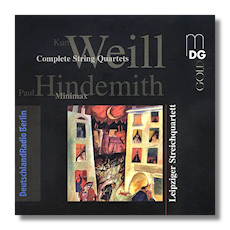
The Internet's Premier Classical Music Source
Related Links
-
Hindemith Reviews
Weill Reviews - Latest Reviews
- More Reviews
-
By Composer
-
Collections
DVD & Blu-ray
Books
Concert Reviews
Articles/Interviews
Software
Audio
Search Amazon
Recommended Links
Site News
 CD Review
CD Review
Kurt Weill / Paul Hindemith

Early Chamber Music
- Kurt Weill:
- String Quartet (1918)
- String Quartet, Op. 8
- Paul Hindemith: Minimax
Leipzig String Quartet
Dabringhaus & Grimm MDG3071071-2 68:08
Summary for the Busy Executive: Salad days.
This CD presents early work by two of the most prominent German composers after the war. Add Schoenberg, Berg, and Toch, and you basically have the A-team. Weill's early maturity always astonished me (he was born in 1900). He wrote many of his best-known masterpieces before the age of thirty. Hindemith, about five years older and almost entirely self-taught, had found major success as performer, teacher, and composer. Indeed, before Weill had finished his studies with Busoni, Hindemith was running one of the most important new-music festivals in Europe.
None of the works here typify the maturity of these composers. Weill's earlier quartet in b-minor stands firmly in the late Romantic era. It reflects his current studies with Humperdinck. The most interesting movement is a Mahlerian Ländler, and it brings to mind Lotte Lenya's reminiscence of the first time she met Weill, to the effect that she knew he was a composer because, like the other young composers she knew, he dressed like Mahler. The rest of it is good student work, but nothing more. The Hindemith counts as little more than a jape. He wrote it for a private gathering of friends and supporters – a party piece. The title Minimax puns on a well-known fire extinguisher and on the names of the von Fürstenbegs, Max and Wilhelmine (Minzi), the "protectors" of Hindemith's Donaueschingen Festival. Every movement title puns on something. For example, the second movement – "Ouvertüre zu 'Wasserdichter und Vogelbauer" (water-tight – or water-closet – and birdcage) – refers to von Suppé's "Poet and Peasant" (Dichter und Bauer) Overture. Unfortunately, the titles are more interesting than the music itself, which could have been written by any competent composer of the period. Significantly, Hindemith never published it and asked that his unpublished works never be played after his death. It does nothing for his currently low reputation and isn't fair to the "real" music he wrote during the same year, like the Fourth String Quartet and Das Marienleben. He should have destroyed it, rather than rely on good will.
The best work by far on the CD is Weill's String Quartet, Op. 8, written five years after the b-minor while the composer still studied with Busoni. It's not yet the sound we associate with Weill – neither the sour and acid of the European music, nor the bittersweet nostalgia of the American – but it is the work of a great composer-to-be. Weill withdrew the first two of the original four movements and substituted a new first movement before première and publication. Unlike the earlier quartet, the work belongs wholly to its time and shows many influences, some superficially contradictory: a pinch of Expressionism, something of the so-called "New Classicism," even some twists on Mahler. Somehow, Weill synthesizes all these strains into something his own. The first movement, an "Introduction," foreshadows the "Melodrama" of Die Dreigroschenoper. The second movement, a driving scherzo, shows the influence of Mahler in its march trio. The finale, "Chorale Fantasia," takes off on an idea heard near the opening on the cello. The most elaborate of the three movements and longer than the other two movements put together, it takes the idea through several different imitative, though not strictly fugal, treatments, song-plus-accompaniment, and rhapsody. One interesting feature, a distinctive rhythm, shows up years later in Dreigroschenoper, again in the "Melodrama." Throughout the quartet, one notices Weill's maturity and poise, his striving for balance and variety, both emotionally and in his technical handling of the medium. The simplest textures nudge up against some fairly fierce and inventive counterpoint. There's also a psychological coolness to it that nevertheless suggests a disturbance beneath the surface. Above all, Weill knows how to keep things moving. His use of rhythm in the service of form is nothing less than masterful.
The Leipzig Quartet plays beautifully, at times perhaps too beautifully. They don't seem to understand that Minimax is crude fun. On the other hand, they deliver a lovely account of the least satirical movement, "Dandelion at the Brook's Shore," a concert waltz. If it is satire, nobody knows its target, and it may well be a Hindemith original. If so, I have to say I didn't know the old man had it in him. They do a professional job on the Weill b-minor quartet, but it's not a work that will wow too many, no matter who plays it. However, give them real meat, like Weill's Op. 8, and they deliver a sensitive, penetrating reading, full of exquisite detail.
Copyright © 2008, Steve Schwartz




















